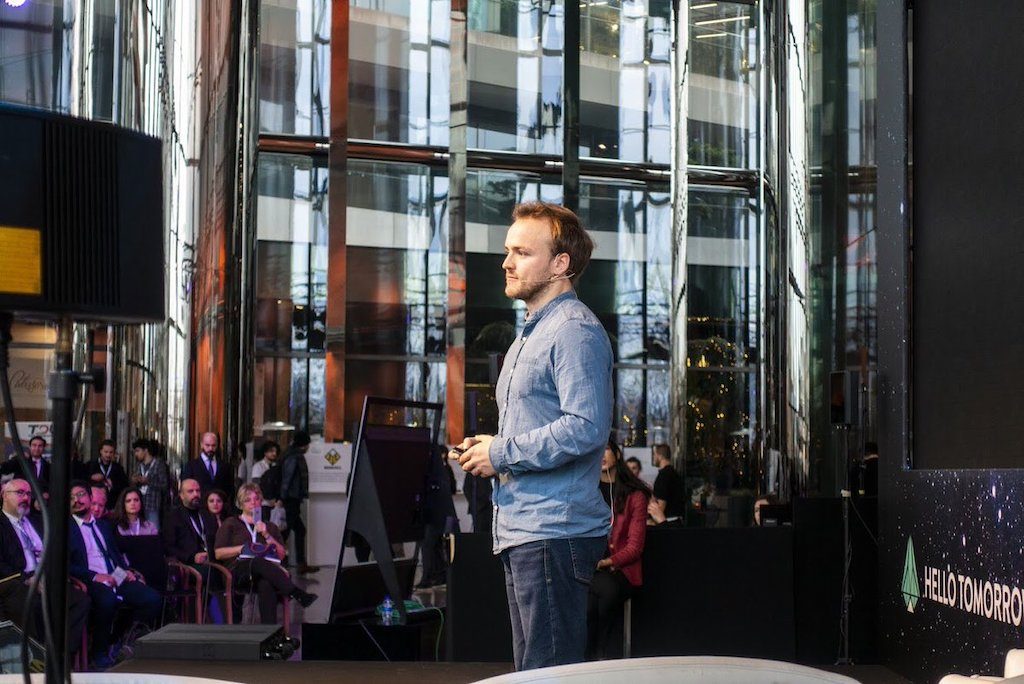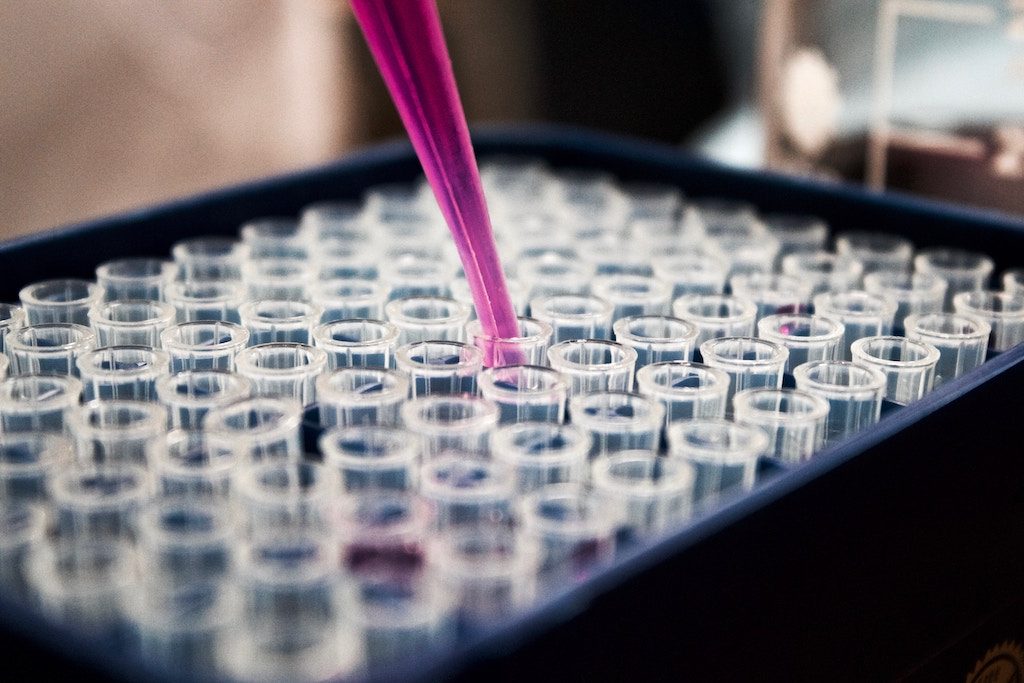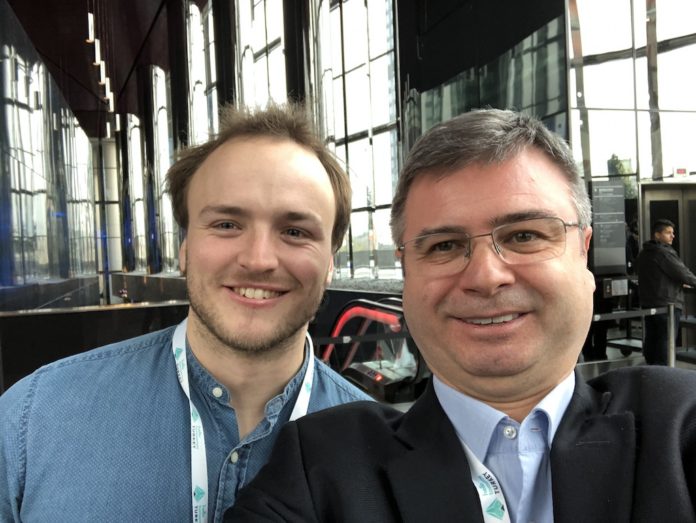I’ve had an enjoyable interview with Tom Stubbs from Chronomics when he was at Istanbul for Hello Tomorrow event. Welcome.
– Could you tell us about yourself, your company and what is epigenetics?
 – We’re all used to think about DNA is the fixed piece of information that we get from our parents that’s going to govern as we saw earlier whether we have blue eyes, curly hair, a reason for certain genetic diseases. We also know that there are people that live on the planet that share the exact same genetic material like identical twins. But there are often cases where one twin will become sick, for instance, maybe developing cancer or heart disease and the other one won’t. And the question is why and how can this happen. The answer is epigenetics which is the science of how your environment and your life style affects how your DNA is controlled. Epigenetic signals are continually being an influence throughout life. So, whether it be through smoking, sleep or stress dictating the tracks that your life is heading down. What’s exciting is that by finding out about this information, you can act early to avoid later issues.
– We’re all used to think about DNA is the fixed piece of information that we get from our parents that’s going to govern as we saw earlier whether we have blue eyes, curly hair, a reason for certain genetic diseases. We also know that there are people that live on the planet that share the exact same genetic material like identical twins. But there are often cases where one twin will become sick, for instance, maybe developing cancer or heart disease and the other one won’t. And the question is why and how can this happen. The answer is epigenetics which is the science of how your environment and your life style affects how your DNA is controlled. Epigenetic signals are continually being an influence throughout life. So, whether it be through smoking, sleep or stress dictating the tracks that your life is heading down. What’s exciting is that by finding out about this information, you can act early to avoid later issues.
Now, a bit of background info on myself. I conducted my Ph.D. and postdoctoral research in the field of epigenetics specifically in the lab of Professor Wolf Reik who is one of the founders in the field of epigenetics. I built epigenetic predictors of lifestyle factors on aging. During this time, I realized the potential for personalized epigenetic testing for proactive and preventive health care.
– Is it a kind of DNA testing?
– Whereas most companies are looking at your fixed DNA, your genome that doesn’t change from birth. We look at your changing DNA, your epigenetics how are that information is controlled, and that’s dynamic and changes within time.
– How do you do that?
– The testing process is relatively simple. You order the test online from chronomics.com, and then that sent you a simple saliva test. You can take it in your home or wherever you want on the tube or whatever. Then, you provide the sample, put it back in the prepaid envelope and send it to us. We then process it. We look specifically at those epigenetic marks in your DNA actually millions of them. This information is then sequenced using the latest in next-generation sequencing. So, the most accurate technology for assessing DNA today. We then derive machine learning signatures from this information. This is then fed back to you as an individual through the online platform that you control access to, and the information is distilled down into simple bite-size chunks that everyone can understand.
– What is the period of this test or process? Monthly or twice a year etc.?
– Currently, most of our customers are yearly based. They take a test every year as part of a health check in if they like to see where they’re at today.
– It’s a kind of check-up?
– Exactly. You can think of it as a check-up at the level of your DNA. We also have some customers that do it more frequently. So, some do it three monthly, some six but on the whole, we advise a yearly test.
– And you give them some lifestyle advice from the results.
– Yeah, exactly. As part of the platform, we partner with many different providers of lifestyle and environmental device or whether it be health coaches, mental well-being. We also have the opportunity for people that take the test to speak with trained DNA counsellors to really get the best use out of this information and to ensure they’re making the best life choices moving forwards.
– Is it oriented for Europe, UK or to the world?
– Regarding our customers to date, they are predominantly from six countries. We have customers in the UK, Spain, Ireland, actually a couple in Turkey. We have some customers from some of the clinics in Turkey. We have some customers in Canada, the US, and Australia. It’s already a quite spread across the globe.
– If a customer gets your suggestions, can they live forever or eternally? Is it possible to live forever?
– There are other companies, other people who are working on the concept of immortality and living forever. We set our standards a little bit lower. Customers with us will be able to make informed decisions about how they want to live their life moving forward to ensure that they’re in the best possible shape 20 to 40 years from now. We’ll see what happens in immortality.
 – What do you think about gene editing, CRISPR? I mean that a doctor who changed in reverse the DNA in China and gave birth. Is it ethical or what do you think about that? Can I get your personal opinion?
– What do you think about gene editing, CRISPR? I mean that a doctor who changed in reverse the DNA in China and gave birth. Is it ethical or what do you think about that? Can I get your personal opinion?
– We are more of testing using epigenetics and then use that information to move forward with your health. If you just want my scientific perspective, here it is.
CRISPR is a fantastic technology. The concept of gene editing has been around for a long time even before crispr. We had TALENS before those other methods are introduced for gene modifications. The real beauty which comes from CRISPR is the precision and ease with which you can make modifications in DNA. CRISPR is widely used now in academia whether it’s used to enable us to understand disease processes better or to introduce new proteins or changes of proteins to understand pathways or whatever. There might be lots of different use cases. As you say that people are now starting to think about using it for therapies. So again, gene-editing therapies have been around for a while. In the case of certain lung complications, for instance, whether it be cystic fibrosis or something like this, people have been using viruses that introduce genes to enable people to try and reduce the burden of that disease. With the advent of and those treatments were by and large not hugely successful because of side effects. There are now, as you say, people are wanting to edit embryos or edit life before it becomes adult.
There is a huge ethical debate going on at the moment as to this. This is actually the reason why not used in humans anyhow. This research has so far only been done in China and hasn’t been able to be published in proper top-tier journals because of the ethical constraints of those journals. Concerning editing of embryos feasibility wise, it’s definitely feasible, and it’s something that’s done quite commonly in modal organisms. So, whether it would be worms or mice for us to understand processes better. But the idea of doing it in humans is something different. It’s something that depends on the use case.
People have different points of view. So if it’s a disease that may mean for instance if somebody is going to suffer their whole life and die early because of something, lots of people would be ok with that being the right thing to do. But then when it comes to something like eye colour or something else or mental ability or whatever then people start to get a bit scared. I think the jury is still out on whether we will end up this becoming more mainstream. But I think, it really is not a question of science anymore. The science is there. It’s a question of what the people want or think should happen. So, it’s more of a case for regulation and legal people and governments rather than for scientists or companies like Chronomics.
– Just a couple of last questions. There is a trend around ‘Quantified Self.’ What do you think about ‘Quantified Self.’ I mean, if we do a monthly testing basis and if we have some wearable devices, is it nice to have?
– There’s a massive movement which what you’re talking about. People are now wanting to have a ‘Quantified Self.’ They would like to be able to define their health at an analytical level. I guess one tribe that would be Quantified Self part of that movement. Another one is more biohacker type which becoming more Quantified Self.
We see Chronomics more mainstream than that. It’s not about checking every last molecule or heartbeat that you have rather getting a yearly snapshot on where your health is at and the risk. It’s about how your risk profiles have changed over time and the environment and lifestyle factors that you can act to reduce your risk burden. So typically, when you’re looking at quantified self or any other metric, you’re taking biomarkers and using them to give you information about the biomarkers and what is the normal level for a given by market and are you within those levels.
The beauty of epigenetics lies here because it draws on that personalized layer of information. The figures come from having the context of your DNA. We’re able not to make averages or draw averages. Your score is within the range of everyone else then we can start to say OK for you. Your score is within a healthy range, and that’s really the shift in thinking that we enable.

– You’ve said that it’s not a treatment. It’s a kind of a proactive lifestyle.
– Exactly. The significant paradigm shift that’s happening. Healthcare is moving from generalist and reactive where the advice that we receive the treatments. We get all opinions of generalist and would be done on a population-wide basis independent of who you are as a person. There are also reactive, so we tend not to do anything until people are ill. So, we wait until you’re coughing up blood or whatever it is to start then treating you or looking into even what you have.
That is shifting now to a personalized and proactive future. That’s mostly being driven by the fact that there’s a rise in chronic disease burden that all of us are being affected by from an economic perspective. The way this paradigm shift is coming about is through the advances of science.
So, through the advances in our understanding of DNA and the fact that we have billions of pieces of information that we can draw on to understand, we can say OK for this given person living in this environment with this lifestyle. These are the things that are affecting in the most, this is what they should be doing to stay healthy, and we can start to do those things proactively.
So, before somebody’s even sick, you can start offering informed advice as to what they should do to stay healthy. It’s a shift in thinking away from helping people that are sick to become healthy to how do you make people that are already healthy less likely to get sick in the first place. We’re really excited to be a part of that.
– Is there anything you would to like add for Turkish readers?
– We are around on social media. So feel free to follow us, and we’d love you to follow us at https://www.chronomics.com/ and Instagram, LinkedIn and on Twitter.
– Thank you so much. It was a very enlightening conversation.
– I thank you for this talk.
Sinan Oymacı – Istanbul



















